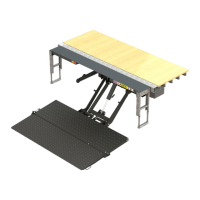11921 Slauson Ave. Santa Fe Springs, CA. 90670 (800) 227-4116 FAX (888) 771-7713
37
PLATFORM RAISES SLOWLY
FLOW
CONTROL
VALVE
VENT/DOWN
PORT
PRESSURE
PORT
FIG. 37-3
1. Use voltmeter to verify power is being supplied to
solenoid terminal “B”. Recharge the battery if volt-
meter indicates less than 12.6 volts (FIG. 37-1).
NOTE: In most cases, you can avoid having to bleed the hydraulic system by
correctly positioning Liftgate platform before opening hydraulic lines. Refer
to following procedure. Save time on the job and prevent accidental fl uid
spills and hazards.
2. Check the hydraulic cylinder. With the platform on the ground, remove the breather plug
or vent line from the vent/down port of the cylinder (FIG. 37-3). Raise the platform even
with the bed. Allow pump motor to run two seconds more while you watch for hydraulic
fl uid at the vent/down port. A few drops of hydraulic fl uid escaping the vent/down port is
normal; however, if it streams from the vent/down port, piston seals are worn. Replace
seals.
3. Check and clean fl ow control valve in high pressure hydraulic line attached to cylinder.
When installing fl ow control valve, make sure arrow on valve is oriented as shown
in FIG. 37-3.
4. See the CHECKING HYDRAULIC FLUID procedure. If necessary, add hydraulic fl uid.
5. Verify the pump motor is grounded to the vehicle frame.
6. Check for leaking hoses and fi ttings. Tighten or replace
as required.
7. Check for structural damage or poor lubrication. Replace
worn parts.
8. Check the fi lter in the pump reservoir. Replace if neces-
sary.
9. With platform on the ground, remove the pressure
hose and fi tting from the pump and replace it with a
0-4000 PSI pressure gauge. Hold the control switch in
the “raise” position. Adjust the relief valve on the side of
the pump until the gauge shows 3250 PSI (FIG. 37-2).
Remove gauge and reinstall pressure hose.
TERMINAL “B”
BATTERY (+)
FIG. 37-1
Keep dirt, water and other contaminants from entering the
hydraulic system. Before opening the hydraulic fl uid reservoir
fi ller cap, drain plug and hydraulic lines, clean up contami-
nants that can get in the openings. Also, protect the openings
from accidental contamination during maintenance.
CAUTION
PRESSURE
GAUGE
RELIEF
VALVE
ADJUST
SCREW
(REMOVE
PLUG)
FIG. 37-2

